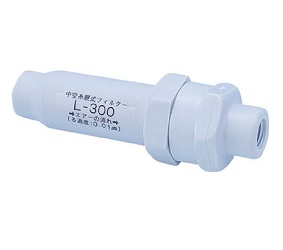(!) Since support from Microsoft will end on January 14 2020, Windows 7 user might not be able to use MISUMI website effectively. Please consider to update your system as ‘MISUMI Website system requirement’.
- การยกเลิกจำหน่ายสินค้าประเภทอุปกรณ์นิวเมติกส์ (Pneumatic equipment) รุ่น “Economy Series” | Notice of End of Sales for Economy Series Pneumatic Equipment Category > คลิก
MAEDA SHELL SERVICE Filter(Plumbing Thread Nominal:1/4)
MAEDA SHELL SERVICE offers products Filter specified by Plumbing Thread Nominal 1/4 from Automation Components product category. There are a total of 1 items. Search and select detailed specifications of parts for your machine with free CAD downloads. MAEDA SHELL SERVICE products are available to order through MISUMI online 24 hours a day. Free shipping, no minimum order.
Configure
Specification/Dimensions
-
Filtration Level
- Not Provided
- 0.01µm
- 0.3µm
- 3µm
- 5µm
- 25µm
- 40µm
- 70µm
- Activated Charcoal
- 10µm
- 0.1µm
- 1µm
- Special High Performance Oil Absorbent
- 120µm
- Fluid Removal Rate 99%
- 2㎛
- _
- _1
- 4μm
- 6μm
- 13μm
- 0.2μm
- 0.4μm
- 149μm
- 0.5μm
- 50μm
- 74μm
- 75μm
- 105μm
- 1000μm
-
Plumbing Thread Nominal
- M5
- 1/8
- 1/4
- 3/8
- 1/2
- 3/4
- 1
- 1 1/4
- 1 1/2
- 2
-
Compressed Air Quality
- General Quality Dry Air
- Ultra-dry Air
- Moisture Containing Air
- Large Particle Containing Air
- Oil Containing Air
- Odor Containing Air
- Particle
- Mold Containing
- Fluid
-
Type
-
Connection Type
- M
- Rc (R)
- NPT
- G
- Tube Flange
- One-Touch Plumbing
- TSJ
- URJ
- Rp
- UOJ
-
Treatment Air Flow Rate(l/min)
-
Operating Environment
-
Drain Cock
-
Bowl Material
-
Bowl Guard
-
Microbial Removal Performance
- LRV≧8
Brand |
|
|---|---|
| CAD |
|
- 1 items
- Sort By
-
You can add up to 6 items per a category to the compare list.

MAEDA SHELL SERVICE
[Features]
● Can remove oil mist from 0.01μm and 99.99% of particles with hollow fiber.
● No rust with special engineering plastic.
● HACCP support.
[Use]
● Medical and food machinery, precision measurement equipment, analytical instruments, semiconductor production and printing.From: ฿ 5,088.93 Days to Ship: 10 Day(s)
10 Day(s)
| Brand |
|---|
| Product Series |
| From |
| Days to Ship |
| Filtration Level |
| Plumbing Thread Nominal |
| Compressed Air Quality |
| Type |
| Connection Type |
| Treatment Air Flow Rate(l/min) |
| Operating Environment |
| Drain Cock |
| Bowl Material |
| Bowl Guard |
| Microbial Removal Performance |
You can add up to 6 items per a category to the compare list. | |
| Brand | MAEDA SHELL SERVICE |
| Product Series | |
| From | ฿ 5,088.93 |
| Days to Ship | 10 Day(s) |
| Filtration Level | 0.01µm |
| Plumbing Thread Nominal | 1/4 |
| Compressed Air Quality | Oil Containing Air / Particle |
| Type | Standard |
| Connection Type | Rc (R) |
| Treatment Air Flow Rate(l/min) | 300 |
| Operating Environment | Standard |
| Drain Cock | - |
| Bowl Material | - |
| Bowl Guard | - |
| Microbial Removal Performance | - |
Loading...
Application example related to this category
Related Categories to Filter
FAQ Filter
- Question: What are industrial filters and their primary functions?
- Answer: Industrial filters are devices used to remove unwanted particles, contaminants, and impurities from air, liquids, or gases. They are essential in maintaining the efficiency and longevity of equipment by ensuring that the fluids or air passing through are clean and free of harmful substances.
- Question: How do I choose the right filter for my application?
- Answer: When selecting a filter, consider the following factors:
- Filtration Level: Determine the required micron rating (e.g., 0.01µm, 0.3µm, 5µm, etc.) based on the size of particles you need to remove.
- Flow Rate: Ensure the filter can handle the volume of air or liquid that needs to be processed.
- Material Compatibility: Choose filter materials (e.g., polyester, polyolefin, coconut fiber) that are compatible with the substances being filtered.
- Operating Environment: Consider the temperature, pressure, and potential chemical exposure in your application. - Question: What types of filters are available and their specific uses?
- Answer: There are several types of filters, each suited for different applications:
- Air Filters: Used in HVAC systems and industrial machinery to remove dust and particles from the air.
- Oil Filters: Used in engines and hydraulic systems to remove contaminants from lubricating oil.
- Water Separators: Remove water droplets from compressed air systems.
- Mist Separators: Remove oil mist and fine particles from air streams.
- Cartridge Filters: Commonly used in liquid filtration for water treatment, food, and beverage industries. - Question: How often should filters be replaced?
- Answer: The replacement frequency of filters depends on the usage conditions and the type of filter. Regular maintenance schedules should be established based on manufacturer recommendations, the operating environment, and the level of contamination. Inspect filters regularly for signs of clogging or reduced efficiency.
- Question: What materials are commonly used in filter construction and their benefits?
- Answer: Filters can be made from a variety of materials, including:
- Polyester: Durable and resistant to many chemicals.
- Polyolefin: Good for general-purpose filtration with excellent chemical resistance.
- Coconut Fiber: Natural material used for its filtration and adsorption properties.
- Stainless Steel: Used for high-temperature and high-pressure applications due to its strength and corrosion resistance. - Question: What are the signs that a filter needs to be replaced?
- Answer: Common indicators that a filter needs replacement include:
- Reduced Flow Rate: A significant drop in the flow rate through the filter suggests clogging.
- Increased Pressure Drop: Higher than normal pressure drop across the filter indicates it is becoming blocked.
- Visible Contamination: Accumulation of particles or discoloration on the filter media.
- System Performance Issues: Reduced efficiency or performance of the equipment the filter is protecting. - Question: How do I install and maintain industrial filters?
- Answer: Proper installation and maintenance are crucial for filter performance:
- Installation: Follow manufacturer guidelines for correct installation. Ensure seals and gaskets are properly positioned to prevent leaks.
- Maintenance: Regularly inspect filters for damage or clogging. Clean reusable filters according to manufacturer instructions and replace disposable filters as needed. - Question: Can filters be customized for specific applications?
- Answer: Yes, many manufacturers offer customization options for filters to meet specific needs. Customization may include size, materials, filtration levels, and connection types to suit unique application requirements.









How can we improve?
How can we improve?